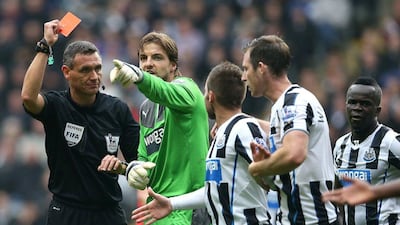On Saturday, Newcastle United led Liverpool 1-0 and seemed in control when Luis Suarez got in behind their defence. Yann Mapou-Mbiwa chased back, was a little clumsy in his challenge, and with a combination of a hand on the shoulder and a nudge to the back knocked over Suarez. Early in the second half, in almost exactly the same area of the pitch, Martin Skrtel placed a hand on Loic Remy’s shoulder and brushed his thigh in nudging the ball away from the forward. The former was probably a foul, the latter probably was not, yet the marginal difference in the force used was the difference between, on the one hand, a penalty and a red card, and nothing at all.
Or, to take just one other example, think back to the third day of the season. Sunderland, having fallen behind at Crystal Palace, had come back to level. The ball spun weirdly out of a Jack Colback challenge, flummoxing John O’Shea, who panicked and stretched into a challenge. He missed the ball by perhaps three inches and tripped Dwight Gayle as a consequence: a penalty and a red card. The punishment for marginal misjudgments can be dreadfully harsh.
The move to outlaw the professional foul replay began in the 1980 FA Cup final, when Arsenal’s Willie Young hacked down West Ham’s Paul Allen as he ran clear. After much deliberation, in 1982/83 the Football League ruled that the professional foul should be a mandatory red card. Fifa followed their lead in 1990, and the guidelines were incorporated into football’s laws in 1997.
As interpreted now, a player will be sent off for the denial of an obvious scoring opportunity, defined as the attacker having the ball at or near his feet, being close to the penalty area and moving towards the goal and having no more than one defender or the goalkeeper in his way. The problem is that – at the moment – intent is not taken into account and as such the law goes far beyond its original remit, which was to cut out obvious cynicism.
Take, for example, Harry Kewell’s handball on the line in Australia’s draw against Ghana at the 2010 World Cup. Perhaps he was culpable in not getting out of the way, but the offence hardly bore comparison with Suarez’s quite deliberate handball on the line against the same opponents in the quarter-final. Kewell was careless; Suarez cynical: should the offences really merit the same punishment?
The issue is particularly acute when a penalty is also awarded. In the Suarez case, replacing a certain goal with a penalty – of which only around 75 per cent are scored – clearly was not enough: without the red card, committing a foul in that instance becomes beneficial. But in instances of fractional misjudgments or accidental fouls (a charging defender clipping a forward’s heels as he suddenly changes direction in front of him, for instance), the double punishment seems absurdly harsh.
Asking a referee to judge intent adds a layer of complexity, it is true, and a grey area would exist, but a regulation that has a range of interpretation is surely better than one that is so manifestly unfair.
sports@thenational.ae
Follow us on Twitter @SprtNationalUAE

